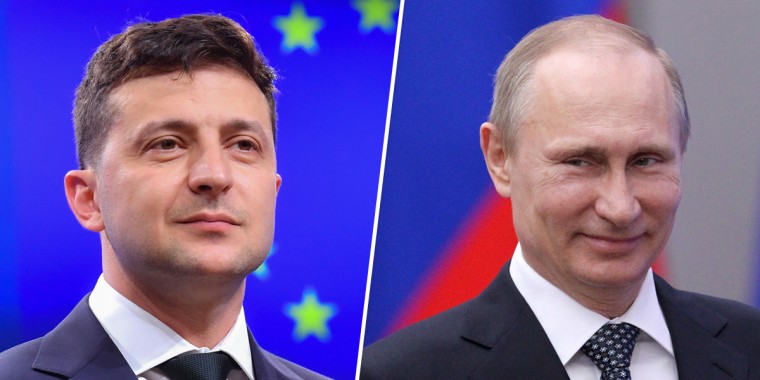MOSCOW — A lot is riding on talks between Ukrainian President Volodymyr Zelenskiy and his Russian counterpart, Vladimir Putin, who are set to sit down in Paris on Monday for the first summit between leaders of the two countries since 2016.
A breakthrough would lead to an end of the war in eastern Ukraine, which has claimed more than 13,000 lives since it began almost six years ago.
The sides are still far apart — Ukraine was under Moscow’s control when it was part of the Soviet Union, and some experts allege Russia wants a return of sorts to the previous status quo.
Meanwhile, Ukraine simply wants Russian forces and their allies in the east of the country to leave.
“Our main expectation for [the summit] and any other formats is what I call RUxit,” Ukrainian Foreign Minister Vadym Pristaiko wrote on Twitter on Tuesday. “We want Russiа and Russian forces to leave Ukraine.”
The meeting will be brokered by French President Emmanuel Macron and German Chancellor Angela Merkel, but Putin and Zelenskiy are expected to have a private meeting. The ultimate goal of talks: to bring a shaky 2015 cease-fire known as the Minsk agreement into force as a first stepping stone toward ending the conflict.
The conflict in eastern Ukraine was sparked by Russia’s annexation of Crimea from Ukraine in 2014, and its subsequent support for pro-Russian separatists who took control over the Ukrainian regions of Donetsk and Luhansk on the border with Russia.
According to the United Nations, some 4 million civilians living in eastern Ukraine have had their lives disrupted by the conflict. A UNICEF report published Monday added that 430,000 children in the region “continue to bear the brunt” of the conflict.
Zelenskiy, a young comedian who was elected president in April on a reform agenda that prioritized ending the conflict, is no doubt aware of such statistics. He has routinely touted the need to resolve the conflict for the sake of those living under it. And in this regard, securing a meeting with Putin is a victory itself.
“It’s a victory when the weapons fall silent and people speak up,” Zelenskiy was quoted by TIME as saying in a joint interview with three other foreign publications in Kyiv published Monday. “That’s already the first step.”
But much will be riding on whether Putin gets what he wants — future leverage over not only eastern Ukraine but also Ukraine in general, said Alyona Getmanchuk, director of the New Europe Center think tank in Kyiv.
“At this point, it is difficult to talk about what kind of concrete deliverables might come from the Paris meeting,” she said.
Like the status of Crimea, aspects of the Minsk agreement have for years now proven irreconcilable. Specifically, the two sides cannot agree on an acceptable sequence for implementing the plan.
While Kremlin spokesman Dmitry Peskov said Putin is prepared to address any topic Zelenskiy desires, even the status of annexed Crimea, he has also categorically ruled out that Crimea is on the table. It is unclear how and if this issue can be resolved. Putin made the annexation of Crimea a key foundation of his support at home.
However, on a smaller scale, the past few months have seen a number of positive developments.
Over three phone calls, the two leaders have facilitated major prisoner swaps, and last month Russia returned three Ukrainian naval vessels seized in a dramatic and dangerous clash on the Black Sea just over a year ago.
Zelenskiy said in the Monday interview that Kyiv’s position is that elections cannot be held in eastern Ukraine until Russian-backed forces are withdrawn and Kyiv’s control over the Ukraine-Russia border restored. The position of Moscow and its proxies in the east has been elections first.
“Putin has no reason to yield, to give ground on Minsk,” says Dmitry Trenin, head of the Carnegie Moscow think tank. “And Zelensky does not seem capable of fully implementing the deal.” The two are likely only to produce a statement affirming their commitment to finding a way to implement the Minsk agreements.
This, at least, could bring a modicum of calm, if not overall peace.

